
So, your roadmap.
Let's get to work.
I don't know how you got here.
But give yourself a hug, my friend:
You've made your first step towards owning your English.
(Or your French. Or your Italian. I work with those too!
I am multilingual, an ICF-qualified coach, and a qualified teacher. 20 years' experience.
I got you.)
Here's how your Language Coaching Journey would work,
in 3 steps
Why you want to build a roadmap
It's very hard to make a plan if you don't know where you're going. Just ask Google Maps!
Before we know what your roadmap will look like, we will need to know what your end goal is:
Do you want to become a great, fluent, bold, confident, natural speaker? (I am sure you do. We need to get more specific.)
Do you want to use English at work, mostly, or for your personal life?
Do you maybe have to become the queen of meetings? Of speaking in public?
Or do you function best if you do things for yourself, and your personal growth, rather than do it for work?
(I function that way, for example, and so did my client Coralie.)
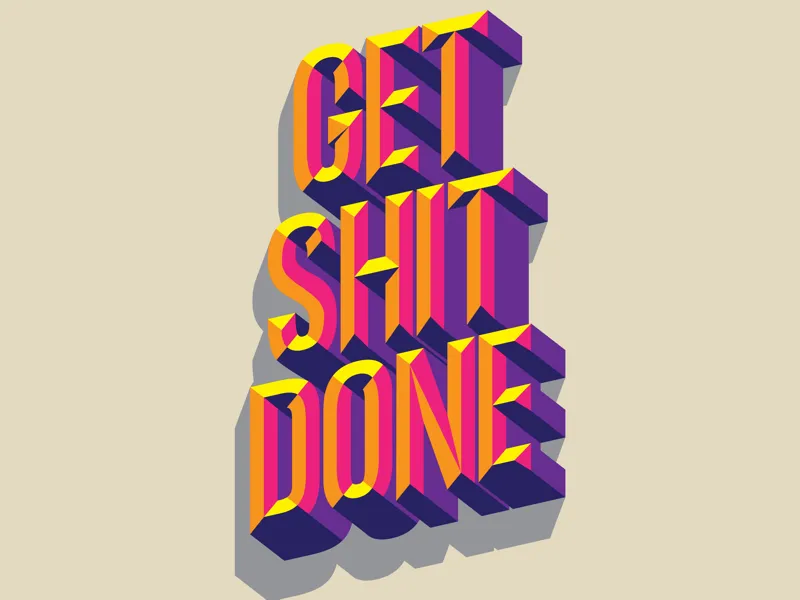
Honestly, sometimes it is about taking action... in good company.
Very often, your problem is not what you're doing.
It's how you are doing it,
how regularly you do it,
And how you feel while you do it.
Very simply put:
You have to find something that makes your language practice something joyful and pleasant.
If you come from a place of must do,
You will not progress as much as if you come from a place of I want to do this!
So ask yourself:
what can help you feel like you're doing this for yourself?
How can speaking good English be a gift you make to yourself?

Once you have unearthed a sense of motivation that makes sense and excites you,
once you have a plan,
Once you stop being scared,
Once you stop talking yourself down,
you will be UNSTOPPABLE.
Step I:
Explore your motivation & set your goals.
This is why my first question to you will always be: why are you here?
Why have you decided to write me?
What do you wish to achieve?
Language coaching is about asking questions.
Lots of questions.
Because if you have to think about your why to give me an answer,
you will find within you motivation that brings you closer to wanting to learn.
I will not motivate you.
You already have motivation inside you.
What is it?
Let's find out.
We will do the same thing with your language related, mechanical goals,
and your functional communication goals.
Based on your real life and on what is relevant to you.
And then?
And then I'll give you a few days to think about all this.
Because our brains hate being rushed.

You are ready to begin.
Let's get to work!
Stage II:
Get coached,
explore what works for you,
discover what doesn't
Stop being intimidated by English
Depending on how long you'll decide to work with me, we will meet most likely once a week, and you will make decisions about your learning , with my help.
We will decide what to do,
what we will do in session and what we will do outside of sessions.
I will prepare materials for us. Handmade with love and care, ONLY for you, following your roadmap and any feedback that might come up during ongoing sessions.

English (or French, or Italian!)
doesn't feel like something scary,
remote and difficult anymore...
Because you have now made it
a normal part of your daily life.
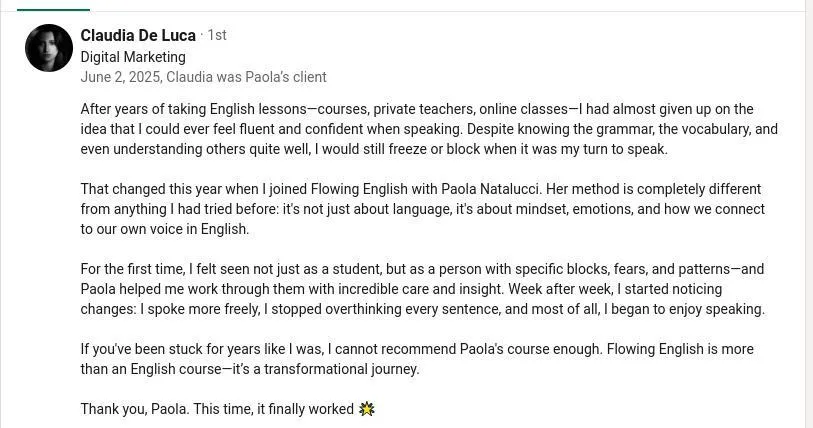
Step III:
What have you learned?
Make a learning plan for your happy, independent future self
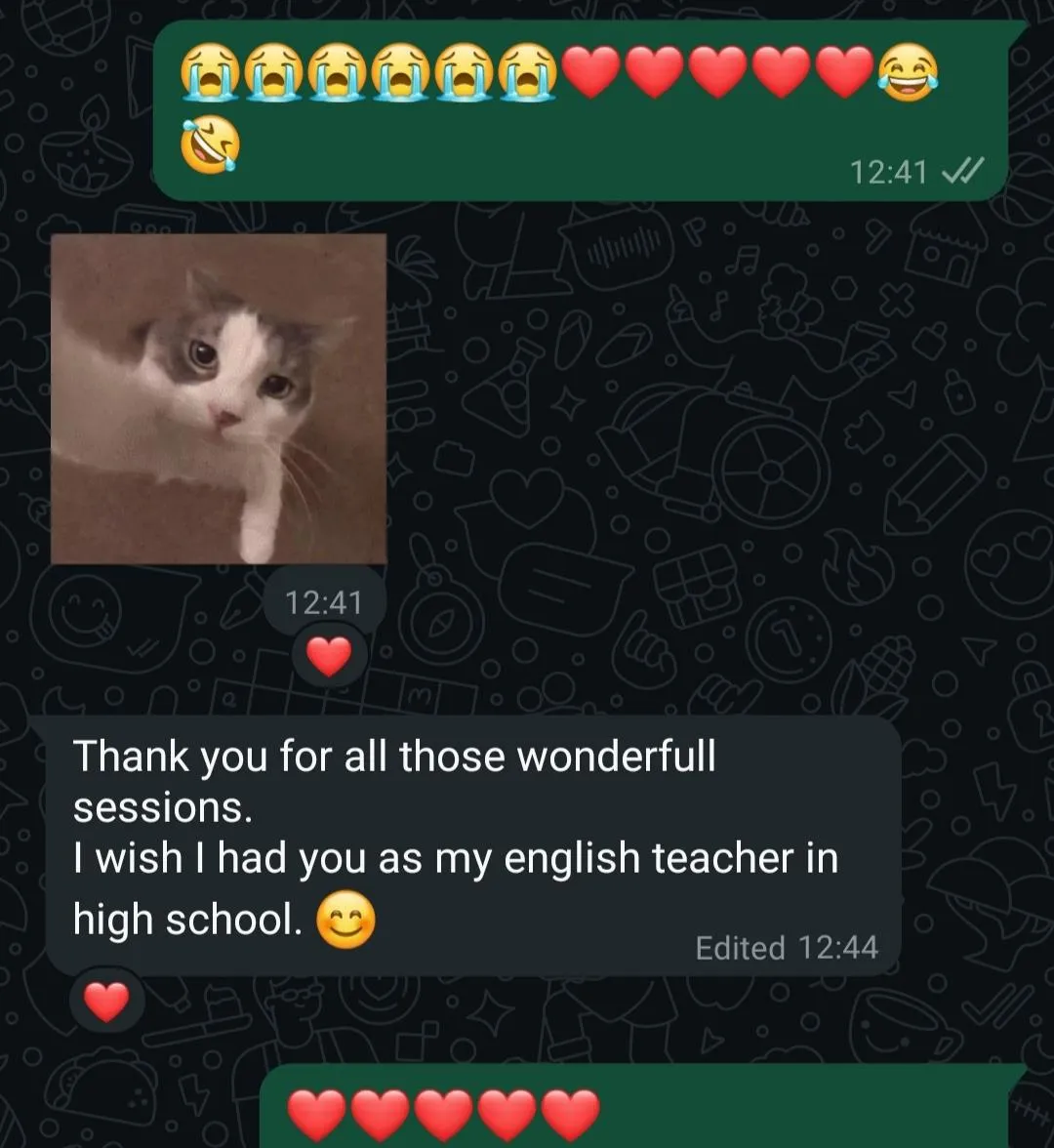
Towards the end of your journey, we will focus on what you have learned -- not about English...
About yourself, as a learner!
Why?
Because if you know what works for you as a learner, you will be able to coach yourself.
This means you will be able to establish healthy learning routines for yourself, independently.
You will know what supports your progress and what kills it.
You will be more self aware,
and you know what that means?
That you will both realise when you're telling yourself lies to stay comfortable and not do the work, on the one hand.
And on the other hand, you will also be able to understand when fear takes over and starts telling you that YOU WILL NEVER MAKE IT.
You won't need me to tell you.
You will know what to do.
Imagine just HOW powerful this is.
Not just for language learning, but for any learning you have to do in your life.
And we both agree that in an ever-changing world, thinking that you have finished learning when you're done with school is... Haha. It's not how it works (if it ever was.)
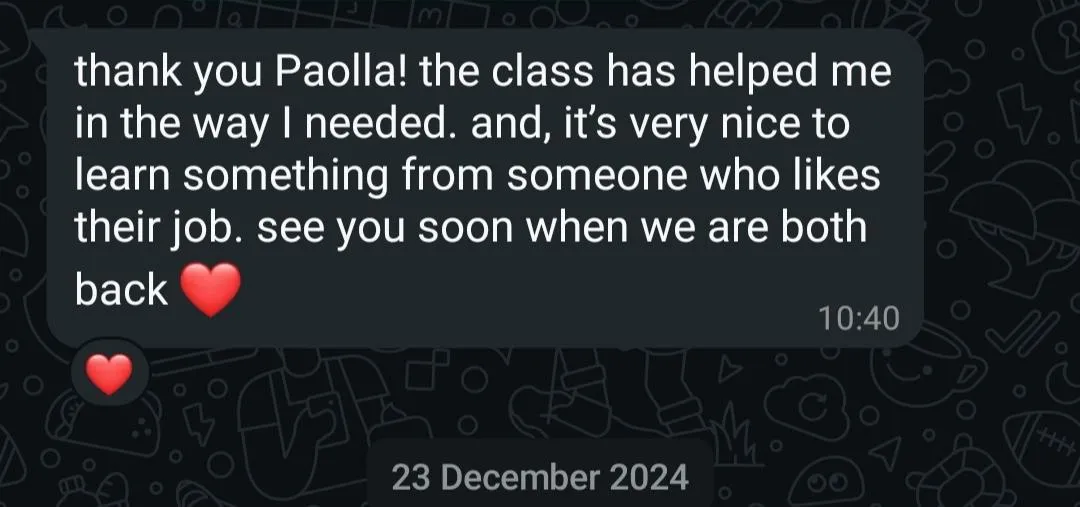
READY TO TALK?
Let's go through the 3 steps, together,
and make your English bloom.
Book a 20-min session with me now.
No sales talk.
No obligation of ANY sort to buy, or make a decision.
I will quickly tell you how Neurolanguage Coaching® works, what it takes from professional coaching practices, and how it draws on brain science and resarch to create your new, unique learning experience.
You will tell me what you need, and what your why for learning is.
That's all. 20 minutes.
It might just the beginning of your new bold, multilingual, multicultural English-speaking era :)
And remember: I can also coach you for French and Italian.
I have experience in both.
And I absolutely love working with all three languages.
Choose your adventure.
Observe the change within yourself.
You can totally tell ifwhat you are doing to support your language progress is constructive for you,
or if you need to change course.
Without me.
This is a skill that will help you for the rest of your life.
Learning how to learn.
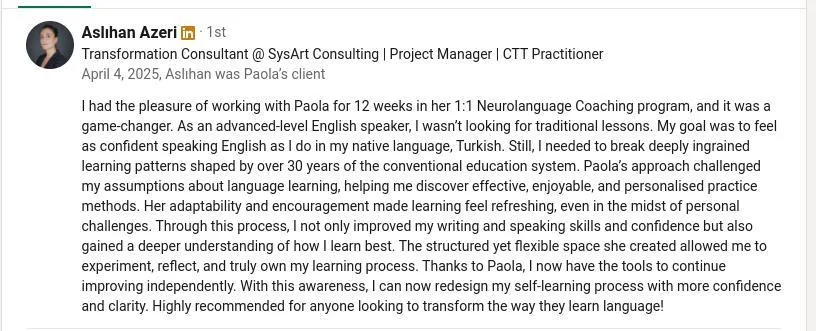
I am using Asli's review here, because honestly?
She explained the results we can get by working together more clearly than I ever could.
...may I invite you to get to work already,
for free?

Speaking is possibly the hardest skill to develop when learning a new language, because it's hard to do on your own.
You can watch Netflix and YouTube on your own, or listen to podcasts.
You can read books, or the news, or social media.
You can even practice writing with journaling.
But speaking?
It requires more thought, but it can be done.
Get my self-talk practice guide,
and practice speaking on your own.
No audience? No stress.
You can also read my blog post on how self-talk practice works, and why it helps.
What happens after we finish our coaching journey?
As always, it depends.
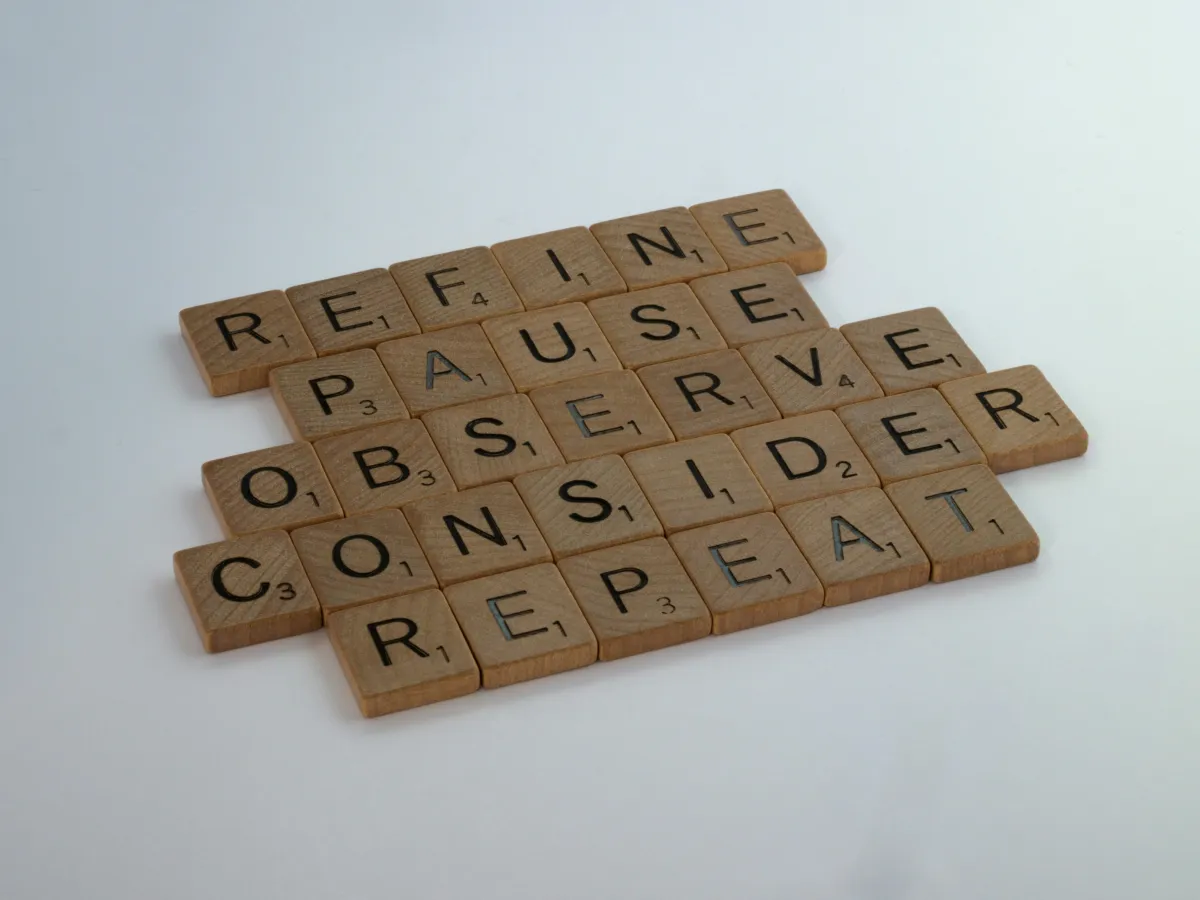
What does it depend on?
Where you will go from here will depend on two variables:
Where you just came from, and where you want to go.
If you've just worked 1:1 with me,
you might want to join The Joy Luck Café to take care of your newly found and beloved fluency.
You also might book more 1:1 time,
to dive into even more specific depth and refinement,
if that's what you wish and what serves you.
If you spent a few months in the Joy Luck Café
and want to grow,
you might want to ask me about my special offers for 1:1 work for Café clients.
There are as many possibilities and combinations as there are people out there.
FAQs
Why should I go for language coaching?
If you are here, it's because you've tried to do it in many other ways before.
And it's because you are a curious person who is happy to learn about herself,
About her or his brain,
About other cultures.
Someone who doesn't just want to learn English to learn English.
Someone who has a great plan that requires a good English level.
Teaching is directive.
Coaching is not.
You are the one in the driving seat.
I am there to drive with you, and help you decide where to go.
I know it might sound scary and challenging. It will actually be pleasant and fun, but yes, language coaching requires your collaboration.
Your coach is your partner in crime. I know I am, at least. Do you need one?:)
How do I know if you are qualified? Everyone calls themselves a coach these days.
I studied with a lady called Rachel Paling.
You can look her up.
She's a qualified ICF coach and coach mentor, a neuroscientist and a graduate in Law and Neuropsychology.
She started a company named Efficient Language Coaching, in Spain.
I became a coach by attending her courses because I felt like something was definitely missing from my previous education as a teacher.
And this is the International Coaching Federation that my school is certified by.
Why am I writing all this? Because coach is one of the most abused words on the internet, sadly.
So I want to be transparent with you.
I became a coach in 2022, because traditional teaching wasn't proving to give my students the results they deserved.
And it was not about language. It was about how they felt and how they related to the language they learned.
Before that, I was a teacher in 5 different countries, on 3 different continents, from 2002 on.
I got my first Cambridge CELTA teaching certificate in 2008, and a DELTA diploma from Cambridge University in 2017.
How fast will I see results with neurolanguage coaching?
The speed of your progress depends on several factors:
your starting level, how often you practice, and your individual learning style.
Many clients report noticeable improvement in confidence and communication within just a few sessions, even as little as five!
Neurolanguage coaching uses brain-friendly techniques, goal-oriented structure, and personalized strategies, so it often makes learningste faster compared to traditional methods.
The focus is on making your progress sustainable and aligned with real-life use, not just memorizing rules.
One of my best days was when a prospective client who had not even started to work with me wrote me after our initial call to say she had a lightbulb moment that surprised her about her English on the same day. That was probably one of my happiest days as a coach, and no, I am not making this up!
The people who take longer to progress? Those who don't take action.
How personalized is the coaching? Will it fit my specific goals and learning style?
Of course! One of the core principles of language coaching is personalization.
This is what separates language coaching from a random language school.
We will use no books unless there is one you want, for instance.
We begin by identifying your goals—whether that’s fluency, business communication, grammar refinement—and I will design each session accordingly.
We also adapt the methods and pace to suit how you learn best, whether you're more visual, auditory, analytical, or intuitive.
This approach ensures that learning is not only effective but also, and most importantly, enjoyable and aligned with your personal and professional needs.
There is no progress without joy!
Is neurolanguage coaching suitable for beginners or only for advanced learners?
Neurolanguage coaching is suitable for all levels—from complete beginners to advanced speakers.
That said, I mostly work with people who already have an intermediate level in general, but who need to improve and refine their speaking skills, and maybe improve their relationship with English: if you hate it, you won't make any progress.
Imagine learning a language like building a house:
beginners start with the foundation, while advanced learners refine the details.
The coaching approach adapts to wherever you are in the process.
Whether you're learning your first few words or fine-tuning fluency, sessions are tailored to your level, pace, and goals—so you're always building with the right tools, step by step.
What puts the neuro in neurolanguage coaching?
The neuro comes from neuroscience—specifically, how the brain learns best. Neurolanguage coaching integrates findings from brain research to create a more efficient, stress-free learning experience.
That means using techniques that reduce anxiety, find and use your intrinsic and extrinsic motivation,
and tap into how your brain naturally processes and retains language.
There is no right or wrong way to learn. Just your way.
It’s not about studying neuroscience; it’s about using its insights to help you learn smarter, not harder.
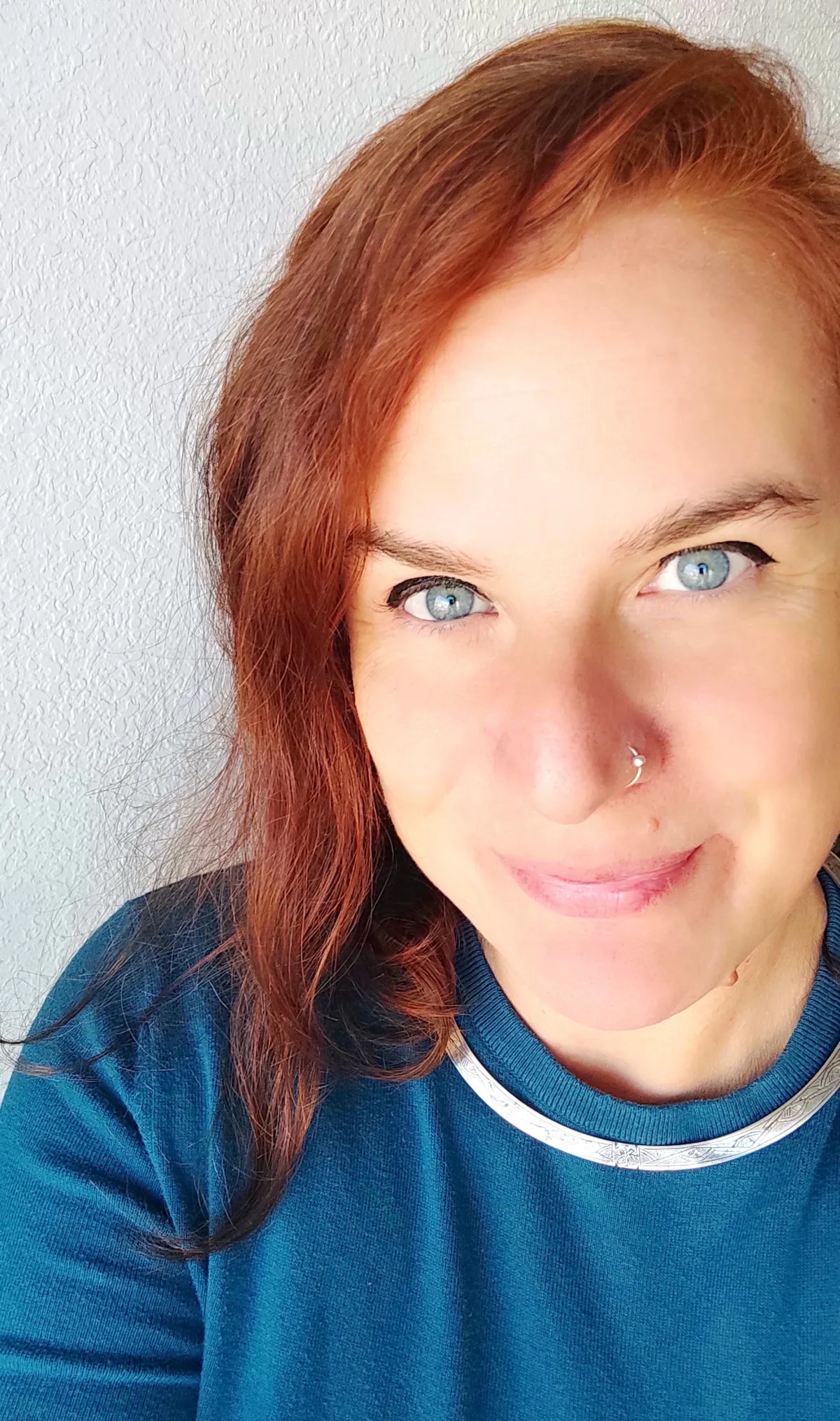
Hey! Paola here.
Nice to meet you :)
I’m a trained and certified language coach.
I speak 5 languages fluently myself,
and I coach people who want to find their joy and their voice in English, French or Italian.
My mission is to get you to access a wider world thanks to your English (or language of choice) — speaking a language well is so much more than just a skill you can put on a CV.
It’s a door to other amazing, colourful,
far away worlds.
I want to help you learn how to learn effectively and joyfully,
without judging yourself,
moving from paralysis and fear to curiosity and wonder.
I also believe in
slow, gentle communication:
we have enough stressors in our lives.
Let’s make our learning space a space of peace, kindness and self acceptance.
Love languages, and they will love you back.
Ready to take control of your learning?
Why language coaching?
In what way is it different from regular teaching?
How will it help me actually solve my fluency problem?
Language coaching is about
Your goals, your pace, your learning style.
Instead of giving you information and hoping it sticks, I work with you to activate the language you already know, build on it with intention, and make sure what you learn is actually useful in real-life situations.
We focus on communication, not perfection.
You’re not being “taught at”—you’re being guided, supported, and challenged just enough to keep growing.
And guess what? That stops you from being fearful and nervous about speaking.
You will LOVE practice instead.
And fluency?
It isn’t about knowing every word or grammar rule.
it’s about feeling confident using the language in the situations you ACTUALLY USE IT IN.
Through coaching, we identify what’s holding you back
(maybe fear of making mistakes, lack of speaking practice, or vocabulary or pronunciation gaps),
and work directly on that.
I’ll help you create new speaking habits, stay motivated,
and feel like the language you are learning works for you.
Not that you work for it, with no joy and no pleasure.
You’ll start noticing the difference not just in how you speak,
but in how
you feel while speaking.
Blooming requires space.
A space for
language growth.
And for personal &
cultural expansion.
Unlock new parts of yourself and of your life.
Yes, you can do that with language coaching.
When you make a new language yours, you're not just learning how to speak—you’re learning how to
connect.
Language becomes a bridge to new friendships, opportunities, and even new ways of thinking.
Each time you find the words to express an idea or have a conversation in another language, you’re proving to yourself that you’re capable of growth.
That confidence spills over into other areas—public speaking, career development, or simply feeling more at ease in social situations.
After our coaching journey...
Ale and Manu got new jobs.
Simone finally decided to start learning ballet in her adult life, and also dived into psychotherapy.
Laleh started learning a new language... On her own.
Michela felt bold enough to go back to theatre after decades she had given up on it.
Marina went into yoga teacher training.
Blooming requires space.
When are you going to choose to bloom yourself?
(All names were changed, because I am bound by ICF ethical standards to complete privacy for anything that is shared in my sessions.)

LANGUAGE COACHING.
NEVER HEARD OF IT?
THAT'S BECAUSE IT'S A PRETTY NEW IDEA.
The idea is to take the best of two incredible worlds that grew so much in the last few years:
neuroscience
and
professionl coaching.
And put it at work for your own language development.
From neuroscience,
we will take the knowledge that no two brains are the same:
what works greatly for your learning may be someone else's poison.
What makes you feel comfortable and happy might make someone else feel miserable.
And this is why we personalise your plan for you and hardly ever use books
-- much more like Prada, rather than Primark.
When appropriate, we will also learn a little about how the brain works.
Why?
Because if you know what's happening inside you, it will be much easier to address your inner troll,
who is loudly telling you you are the worst.
When actually,
you are just having a fight/flight reactionbecause getting out of your comfort zone is scary for your limbic system
(don't worry, I'll explain everything!)
From professional coaching,
We will take the goal-based structure with regular reviews, and the coaching spirit.
This means I will not direct you,
but I will walk with you.
You will make a lot of decisions on your learning and on our actions,
with my help, based on your needs.
Why?
Research tells us choice breeds empowerment and learner responsibility:
these two ingredients contribute to the birth of an independent learner.
And then, there's a third, very important ingredient:
YOU.
Your aspirations. Your interests. Your work. Your commitment.
Your actions. Your time management.
There is no change without action.
How will you take responsibility for your growth and your progress?